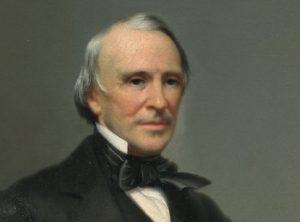
Wyndham Robertson
*Wyndham Robertson was born on this date in 1803. He was a white-American politician, slave owner, and businessman.
He was born near Manchester, Chesterfield County, Virginia, across the James River from Richmond. His parents were William Robertson and his wife Elizabeth Bolling, descended from Pocahontas and John Rolfe. His paternal grandfather Archibald Robertson emigrated from Scotland to the James River. His father was a member of the Virginia Council of State.
Wyndham Robertson attended private schools in Richmond. He graduated from The College of William and Mary in 1821 and read law. In 1831, Robertson married Mary Trigg Smith, daughter of Captain Francis Smith of Washington County, Virginia, who served in the Continental Army and the Virginia Senate during the War of 1812. They had at least four daughters, Mary Robertson, Elizabeth Robinson, Kate Robertson White, Pocahontas, and two sons, Francis Smith Robertson and Wyndham Robertson Jr. In 1858, Robertson returned to Richmond.
In the 1840 U.S. Federal Census, he owned 11 slaves, and at least 28 in the 1850 U.S. Federal Census, his father-in-law, Capt. Francis Smith owned 107 slaves in the 1840 census, of whom 20 were engaged in farming. In the 1860 census, Robertson held seven enslaved persons in Richmond and at least 75 in Washington County, Virginia.
In 1859, Richmond voters again elected Robertson to the Virginia House of Delegates as one of their three delegates in the 1859-1861 session based on the symbolic changes after adopting the Virginia Constitution of 1850 and population shifts documented in the census. As Virginia struggled with the idea of seceding from the United States, Robertson was a staunch Unionist and tried to prevent its secession. He later characterized himself as a "friend to peace and the Union" and noted that he had actively opposed South Carolina's call for a Southern Convention in 1859.
At the Henry Clay banquet in April 1860, at which former President John Tyler was present, Robertson gave "The Union" toast, followed by a short speech: The Constitutional Union of the States" - The Union of the States is the harmony of the spheres. While obedient to the laws of their creation, they sing ever as they go 'glad tidings of great joy to all the world. Rebelling against them, light and joy are swallowed up in darkness, and order falls back into primordial chaos. After South Carolina and several other states started seceding in the winter of 1860-61, Robertson still advocated against Virginia following suit.
Robertson, a Whig, advocated for the Union during the secession crisis that precipitated the Civil War. On January 7, 1861, he presented the "Anti-Coercion Resolution," which rejected secession. Still, he stated that if the Federal government used coercion toward the seceded states, Virginia would fight, which was duly adopted. The Episode at Fort Sumpter in Charleston Bay changes many things. When President Abraham Lincoln called for troops on April 15, 1861, Robertson believed the Anti-Coercion scenario met and was "from that time forth zealously active in all measures for the defense of his State." Virginia seceded after voters approved a referendum the following month. Robertson continued as the leading vote-getter within Richmond's delegation to the House of Delegates for two additional terms; his legislative service ended as the Confederacy fell in 1865.
In 1863, Robertson opposed and helped to defeat a bill to fix food prices, which he believed was "fraught with the direst mischief," despite food riots in Richmond. Robertson refused when Richmond citizens presented a resolution asking their representatives to support a similar bill or resign. When he found that his colleagues had consented, he resigned to avoid misrepresenting his constituents. The House, however, requested that his resignation be withdrawn until the wishes of his constituents could be determined. A formal poll was held, and it was determined that a majority did not support the bill, so Robertson retained his seat.
Near the end of his life, Robertson published a book about Pocahontas and her descendants, including himself. . the Acting Governor of the U.S. state of Virginia from 1836 to 1837. He also served multiple terms in the Virginia House of Delegates, the second series representing Richmond during the American Civil War. He died on February 11, 1888.